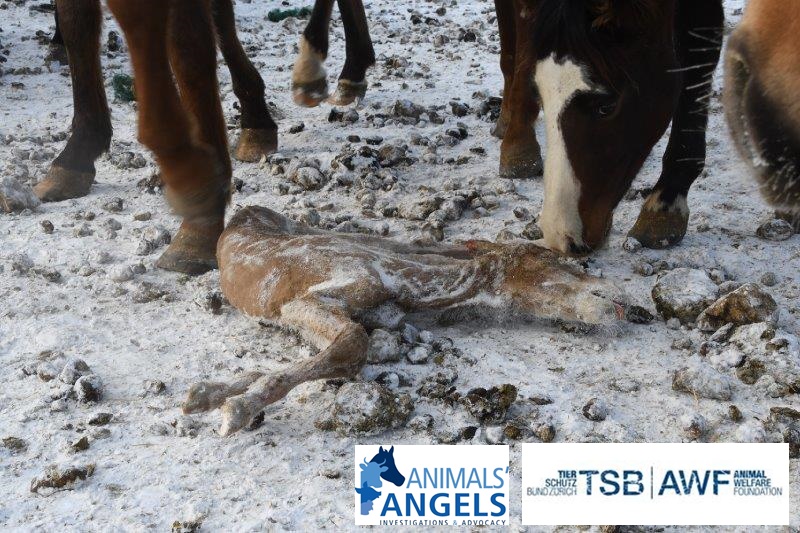Westminster, MD:
Thirteen animal welfare organizations - from Europe, South America, and North America - call for an end to inhuman horse slaughter and a deceptive campaign to mislead consumers.
Since 2012, the animal welfare NGOs Animals' Angels (USA), Tierschutzbund Zürich (Switzerland), Animal Welfare Foundation (Germany), and others have been investigating the production of horse meat in North and South America.
Now they are saying that enough is enough-and they have the evidence to prove it.
"Our recent footage has confirmed again that nothing has changed for horses trapped in the slaughter pipeline," says Sonja Meadows, president of Animals' Angels, the leading US-based animal welfare organization. "
The horse meat industry is riddled with cruelty. Sick horses aren't receiving care, animals are abused with electric prods, over-crowded stalls are left uncovered in freezing temperatures, and mares and foals are dying during birth. The situation is heartbreaking, and change is long overdue."

Ms. Meadows is referring to
never-before-seen
video documentation, which depicts the harsh treatment of horses at slaughterhouses that import to the European Union. For example, at Bouvry Exports in Alberta, the horses are kept outside when temperatures drop to -22 Degrees Fahrenheit. "In the film, we see horses being fattened until they get sick," explains Sabrina Gurtner, project manager at the Animal Welfare Foundation in Germany. "Dry feed and clean resting areas are not available or sufficient. Hoof care and veterinary treatment of injuries and diseases are non existent." Ms. Gurtner describes the situation at "s
ystematic neglect and torture."
The
footage also shows how the slaughterhouses prepare for announced audits. Pregnant and injured horses are removed from the slaughterhouse premises before the inspections. Only a small number of healthy horses are presented to inspectors,
misleading the auditors and avoiding scrutiny.
But that's not the only method the slaughter industry utilizes to deceive would-be customers. In recent years, slaughterhouses and meat distributors have also promoted a public marketing campaign, ironically dubbed "Respectful Life."
The "
Respectful Life" campaign is managed by the Belgian meat federation, FEBEV. For the effort, FEBEV has partnered with two researchers from the Catholic University of Leuven, Belgium, to promote the idea that changes have been made to the horse meat industry-
changes that are certainly not reflected in the newly released footage. In addition, the Swiss association of horsemeat importers, VPI, has commissioned the global company Société Générale de Surveillance, SGS, to conduct audits of slaughter facilities in North and South America and control oversight mechanisms.
"This latest campaign is a last-ditch effort to sway public opinion," says Ms. Meadows. "But frankly, it's too little too late-our community has had enough, and we demand change."
Ms. Meadows explains that "Respectful Life" claims to certify the slaughter pipeline and ensure humane treatment. But, in reality, only the management system is certified, not the animals' welfare-and slaughterhouses regularly avoid accurate inspections by hiding sick horses and incompliant facilities. In addition,
by the time horse meat reaches European supermarkets, the origin is largely unknown. "Information about where the horses came from and the drugs that could be in their systems is provided by the kill buyer," explains Ms. Meadows. "And there is no accountability to keep them honest."
The "Respectful Life" campaign is likely an attempt by the horse meat industry to encourage imports to Europe, which have steadily declined with increased public dissent about the welfare of the animals involved. In
2013, many Swiss retailers and grocery chains
ceased horse meat import and sale from North and South America and, in 2015, the EU suspended the import of horse meat from Mexico. Since then, many supermarkets in the Netherlands and Belgium also stopped selling cruelly produced horse meat.
"European consumers care about the welfare of these horses and the safety of the food on their tables," says Ms. Meadows, who along with her European partners says
it is time for an immediate suspension of all horse meat imports to Europe.
"Horse slaughter is certainly inhumane, but horse meat is also unsafe for human consumption, because we don't know what drugs or other substances the animals were given. Our new investigations have proven again that both welfare and food safety cannot be guaranteed. The only logical response to our latest findings
is a complete halt of horse meat imports from North and South America and the termination of the deceitful "Respectful Life" campaign."